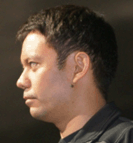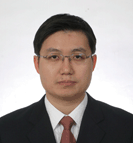
 |
fields of embodied and developmental robotics. In recent years, we have been observing the rapid proliferations of the usage of robots outside the traditional fields of the industries. In the very near future, it is easy to predict that robots will become an integrated part of our society. Robots, that currently run in structured settings, as in factories, will soon have to deal with various tasks in unpredictable environments. Their flexibility and resiliency in dealing with these dynamic settings should be addressed by enabling them to autonomously adapt not only their controllers, but also their morphologies. Naturally, we also have to innovate the production process of the robots that will soon face difficulty in efficiently supplying robots with various morphologies and tasks. The implementation of machine learning and self-organizing mechanisms, not only in running autonomous |
| robots, but also in creating new manufacturing process of the robots will be crucial in supporting the further proliferation of robotics technology in our society. This special session focuses on the machine learning techniques implementable to physical robots running in real-world environments, and to the novel manufacturing process of the robots. In addition, the special session also aims to provide an opportunity for international researchers to share and review recent advances in the foundations, integration architectures and applications of hybrid, adaptive and real-time systems in vision and control. | |
 |
systems and components, represents one of the most important developments in education of the last two decades. Robotics courses focusing on project based learning, systems thinking, and interdisciplinary design have become widely accepted. In the robot projects students develop and program intelligent robots to execute different tasks and participate in national and international robot competitions. The progress of robotics intelligence technology, as well as educational theory and practice opens promising opportunities for further development of educational robotics. This thematic session aims to bring together academic researchers, educational practitioners and technology specialists and promote exchange of ideas and collaboration based on the common interest in educational robotics. Participants of RiTA and of the associated events, namely |
| International Robot Olympiad and the industry fair, are invited to take active part in the Education Session. The purposes of the session are to consider and discuss theoretical approaches, technological innovations and best practices that enable to upgrade the level and extend the scope of learning with robot systems and make robotics of interest to a wider audience of students. | |
 |
may assume it understands in order to perform day-to-day operation. Such knowledge may be domain specific (such as entertainment domain) or has more generic purpose (such as keeping company for elderly people). The actions that a robot takes should take into account not only its own body and mode of operation (which is typically assumed), but also the environment that it needs to sense, and adapt its sensors reading to human perception. Both the environment and the human perceptions need to be represented in such a way that meaningful communication becomes possible. This communication may be done in natural language, with gestures, pictures, music, or any other form. It is also important to understand that it is not sufficient for a robot to sense some physical data or |
| to identify signals or words of a natural language – it must have an ability to become aware of what information these data contain for a human. To achieve that, it must possess an a-priory body or knowledge such as common sense rules as well as domain specific basics or be able to learn from its experiences and modify its body of knowledge from what is learned. The purpose of this session is to present and discuss research in the direction of representation of knowledge and reasoning for robotic communication with humans in any of the forms. By the very nature of their cyber-physical existence, robots in very aspect of their functionality should be addressed in a not only interdisciplinary, but also multi-disciplinary and transdisciplinary fashion. This session is particularly interested in development, merging, and forging such an approach to the problem of robotic knowledge representation. Moreover, such knowledge representation should feasible for the applications and implementations, not just as a theoretical constructs. | |
 |
increase an efficiency of the required job and the work convenience. Especially, many industrial robots and automation equipment are applied in the manufacturing spot to increase productivity and safety of workers. This session focuses on the design philosophy of a mechanism of industrial robots and components (including H/W and S/W) and control methodology of the newly designed machine considering the industrial applications. For the usefulness in the industrial spot, an interactive approach of functional S/W blocks or the teaching strategy of a robot will be dealt. Also, several mechanism design and control methodology will be introduced. We hope to bring together outstanding researchers to discuss current trends and problems in this area. |
 |
applications for robotics and vehicles. For the deployment of humanoids, mobile robots, unmanned vehicles and autonomous vehicles, various intelligent systems and its applications are needed to study. Intelligent systems for robotics and vehicles include computational intelligence techniques including fuzzy logic control systems, neural networks, and evolutionary computation; machine learning and smart systems including data mining, intelligent service practices; and intelligent information processing including pattern recognition and image processing. Its applications include mechanisms, electronics, sensing and actuating system, and control system for robotics and vehicles. |
 |
Humans participate in organizations in almost every aspect or their lives; work, social and education. As common interactions with humans, robots, sensors, software agents and machines, become more pervasive, all of these actors will integrate together to form new cyber-physical systems. These new systems will require networking, communication, interaction, organization and high level interactive behaviors, like human organizations. These cyber-physical systems will be defined by not distinguishing between humans, agents, robots, machines and sensors, in how they apply capability or accomplish goals. To create this new class of cyber-physical systems, new models, enabling high-level interaction between humans, agents, robots, machines and sensors, must be developed. This session concerns |
| techniques, models, algorithms and infrastructures supporting the development of interactive scenarios for large organizations, or societies, of robots, seamlessly working together to accomplish large goal sets, in complex task domains. The need to often focus on numerous goals, tasks and events creates a domain scenario where the application of intelligence is used to convert information into decisions in a quicker and more deliberate manner. The result is an overall system model and architecture capable of efficiently integrating humans and various instances of non-human, but intelligent actors, within the same organization. This session will be split into two attached sessions. One session will involve theoretical and technology-based approaches and the other on specific applications of these approaches to specific robotic tasks and problems. | |

